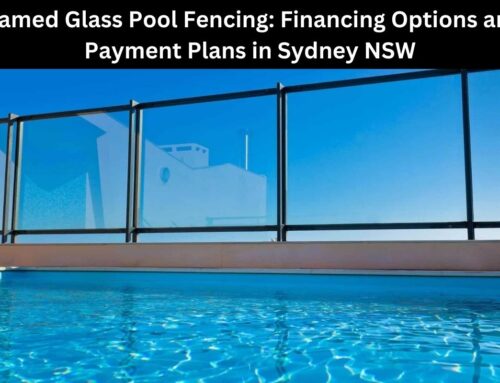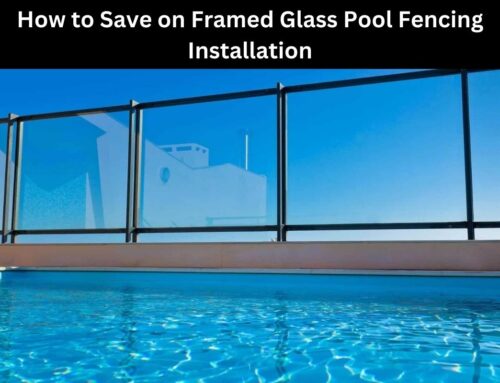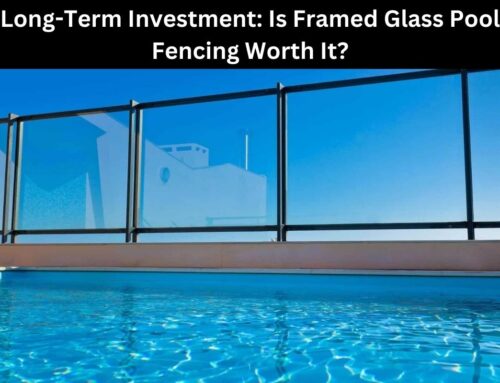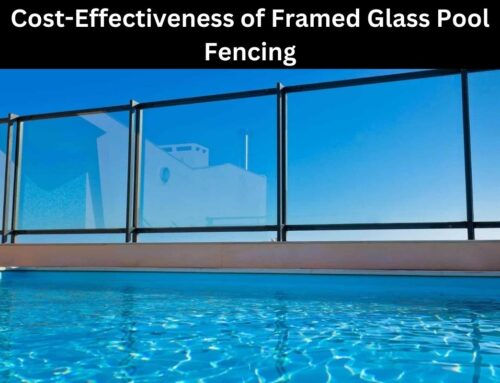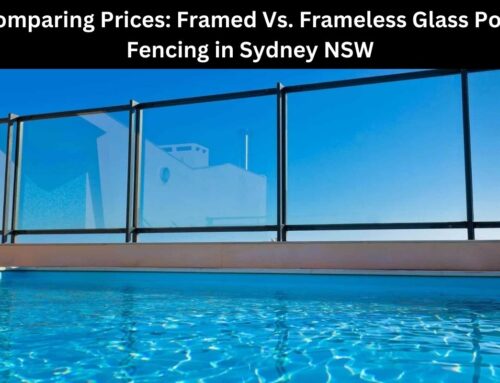Table of Contents
One might argue that the choice of materials used in framed glass pool fencing has little impact on its cost. However, a closer examination reveals that materials play a significant role in determining the overall expense of such structures.
This article will explore the various materials commonly used in framed glass pool fencing and their impact on cost in Sydney, NSW.
Stainless steel, known for its durability and classic appeal, is often considered a premium option. Although it may initially appear more expensive, its long lifespan and minimal maintenance requirements can offset the initial investment.
In contrast, aluminum offers a cost-effective alternative that still provides durability and visual appeal.
Glass, a popular choice for modern aesthetics, is a stylish option that can significantly impact the cost of framed glass pool fencing. While it may be more expensive than other materials, it offers a sleek and unobstructed view, enhancing the overall visual appeal of the pool area.
Wood, being a natural and warm material, can be an attractive choice for those seeking a more traditional look. However, it may require regular maintenance and can be susceptible to rot and decay, increasing the long-term cost.
Lastly, composite materials provide a versatile and low-maintenance option that combines the benefits of various materials. This can be a cost-effective alternative that offers durability and aesthetic appeal.
By understanding the impact of different materials on the cost of framed glass pool fencing, homeowners in Sydney, NSW can make informed decisions and create a safe and visually appealing pool area.
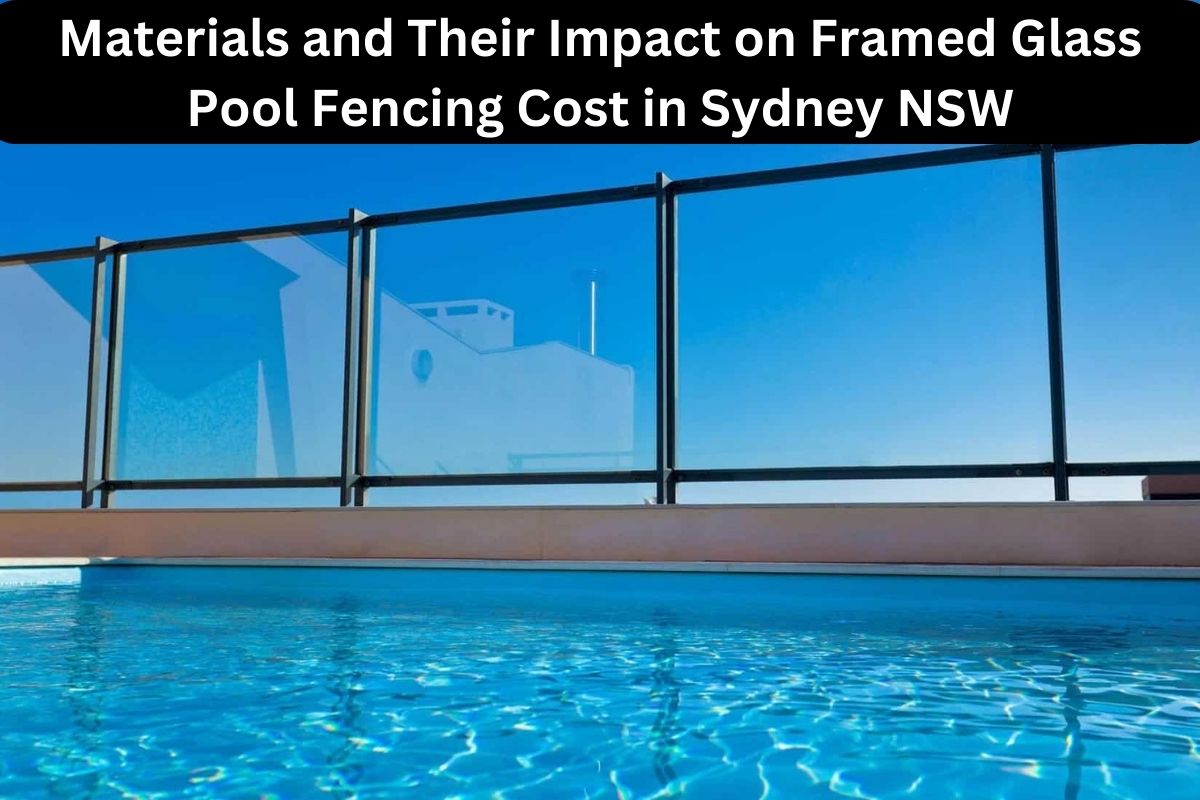
Key Takeaways
- Stainless steel is a premium and durable option for framed glass pool fencing in Sydney, NSW.
- Aluminum is a cost-effective alternative that offers durability and visual appeal.
- Glass provides a sleek and unobstructed view but is more expensive and requires regular maintenance.
- Composite materials are versatile, low-maintenance, and eco-friendly, making them an excellent choice for framed glass pool fencing in Sydney, NSW.
Stainless Steel: A Classic and Durable Option
Stainless steel, a timeless and resilient choice, offers a durable solution for framed glass pool fencing, ensuring long-lasting protection and enhancing the aesthetic appeal of the pool area. With its exceptional longevity, stainless steel is highly resistant to corrosion, making it an ideal material for use in outdoor environments where exposure to water and other elements is unavoidable. This durability translates into reduced maintenance requirements, as stainless steel does not rust or stain easily, thus eliminating the need for frequent repairs or replacements.
In addition to its durability, stainless steel also adds a touch of elegance to the pool area. Its sleek and polished appearance complements the transparent nature of glass, creating a sophisticated and modern look. Moreover, stainless steel can be easily customized to suit different design preferences, offering a versatile option for homeowners and designers alike.
Transitioning into the subsequent section about aluminum: a cost-effective alternative, aluminum presents an appealing option for those seeking a more budget-friendly option without compromising on quality.
Aluminum: A Cost-Effective Alternative
Aluminum is often considered a cost-effective alternative to stainless steel for framed glass pool fencing in Sydney, NSW.
One of the main pros of aluminum is its affordability, making it a popular choice for those on a budget.
Additionally, aluminum is known for its lightweight nature, which makes it easier to install and transport.
However, one major con of aluminum is its lower durability compared to stainless steel, as it is more prone to scratches and dents.
Pros of Aluminum
One advantageous attribute of using aluminum for framed glass pool fencing in Sydney, NSW is its inherent strength and durability, ensuring long-lasting and reliable protection around the pool area.
Aluminum is known for its ability to withstand harsh weather conditions, such as heavy rain, strong winds, and intense sunlight, without corroding or deteriorating. This durability makes it an excellent choice for outdoor applications like pool fencing.
Additionally, aluminum is lightweight, making it easy to install and handle during the construction process. Its lightweight nature also reduces the strain on the pool enclosure structure, ensuring that it remains stable and secure.
Furthermore, aluminum is highly resistant to rust and corrosion, prolonging its lifespan and reducing the need for frequent maintenance. Its durability and low-maintenance qualities make aluminum a cost-effective choice for framed glass pool fencing in Sydney, NSW.
Transitioning into the subsequent section about the ‘cons of aluminum’, it is important to consider some potential drawbacks of this material.
Cons of Aluminum
Despite its many advantages, there are some drawbacks to using aluminum for framed glass pool fencing. For example, in areas with high levels of pollution or saltwater exposure, the aluminum may gradually corrode over time, compromising the integrity of the fence and potentially posing a safety risk. Additionally, aluminum is not as strong as other materials such as steel, which means it may not be able to withstand heavy impacts or strong winds. Moreover, aluminum is a relatively expensive material, especially when compared to alternatives like steel or vinyl. Finally, aluminum can be more difficult to customize and may not offer as many design options as other materials. These disadvantages and limitations should be considered when choosing the material for a framed glass pool fence. Transitioning to the subsequent section, glass is a stylish and modern choice that offers its own set of advantages.
Glass: A Stylish and Modern Choice
Glass is a popular choice for framed glass pool fencing due to its stylish and modern aesthetic. One of the main advantages of glass is its ability to provide unobstructed views of the pool area, creating a sense of openness and spaciousness.
Additionally, glass is a durable material that is resistant to rust and corrosion, making it a long-lasting option for pool fencing. However, it is important to note that glass can be more expensive than other materials, and it may require regular cleaning and maintenance to keep it looking its best.
Pros of Glass
The advantages of utilizing glass materials for framed glass pool fencing in Sydney, NSW are numerous, leaving viewers with a sense of awe and tranquility as they witness the seamless integration of safety and aesthetics.
One of the key benefits of using glass is its ability to provide an unobstructed view of the pool area, allowing homeowners to keep an eye on their children or guests. Additionally, glass fencing creates a feeling of spaciousness, making the pool area appear larger than it actually is.
Glass is also a durable material, resistant to harsh weather conditions and fading from sunlight exposure. Furthermore, glass fencing requires minimal maintenance, as it does not need to be repainted or stained.
With all these advantages, glass is an ideal material for framed glass pool fencing. Transitioning to the subsequent section, however, there are also some cons to consider.
Cons of Glass
Glass is undoubtedly a popular choice for framed pool fencing due to its aesthetic appeal and transparency. However, it is not without its drawbacks. One of the main concerns with glass is its maintenance. Glass panels require regular cleaning to maintain their pristine appearance, as they easily show fingerprints, smudges, and water spots.
Additionally, glass is fragile and can break upon impact, creating a safety hazard. Although tempered glass is used for pool fencing, it is not completely immune to damage. Accidental impacts or extreme weather conditions can lead to cracks or shattering, necessitating costly repairs or replacements. These factors contribute to the overall cost of glass pool fencing, as regular maintenance and potential repairs need to be factored in.
Despite these limitations, glass remains a popular choice due to its elegant and modern look. Transitioning to the subsequent section, wood offers a natural and warm alternative to glass.
Wood: A Natural and Warm Material
Wood, with its organic texture and warm hues, adds a natural and inviting touch to framed glass pool fencing, enhancing the overall aesthetic appeal. Apart from its aesthetic value, wood is also a sustainable choice for pool fencing. It is a renewable resource that can be responsibly harvested and replanted. However, it is important to note that wood requires regular maintenance to ensure its longevity and durability. Here are some wood maintenance tips for framed glass pool fencing:
- Regular cleaning: Use a mild detergent and water to clean the wood surface. Avoid using harsh chemicals or abrasive cleaners that can damage the wood.
- Sealing: Apply a protective sealant to the wood surface to prevent moisture penetration, which can lead to rot and decay.
- Staining or painting: Apply a wood stain or paint to enhance the appearance of the wood and provide an additional layer of protection against the elements.
- Inspection and repair: Regularly inspect the wood for any signs of damage, such as cracks or rot. Promptly repair or replace any damaged wood to maintain the integrity of the fence.
- Avoid direct contact with water: Although wood can withstand some exposure to water, it is important to avoid prolonged contact with water to prevent swelling, warping, and decay.
Transitioning into the subsequent section about composite materials, they offer a versatile and low-maintenance option for framed glass pool fencing.
Composite Materials: A Versatile and Low-Maintenance Option
Wood is undoubtedly a popular choice for many homeowners due to its natural and warm aesthetic appeal. However, it does come with its drawbacks, such as high maintenance requirements and susceptibility to weathering. As a result, homeowners may seek alternative materials that offer similar visual appeal but with added benefits. This is where composite materials come into play as a versatile and low-maintenance option for framed glass pool fencing in Sydney, NSW.
Composite materials are a combination of different materials, typically wood fibers and plastic, resulting in a durable and long-lasting product. One of the key advantages of composite materials is their affordability. They tend to be more cost-effective than traditional wood, making them an attractive option for homeowners on a budget.
Additionally, composite materials are known for their low-maintenance characteristics. Unlike wood, they do not require regular staining or sealing to maintain their appearance and structural integrity. This not only saves homeowners time but also reduces the overall cost of maintenance.
Moreover, composite materials are often considered eco-friendly. By utilizing recycled materials, they contribute to reducing waste and promoting sustainability. This makes them a desirable choice for environmentally conscious individuals who want to minimize their carbon footprint without compromising on aesthetics or durability.
In conclusion, composite materials offer an affordable and eco-friendly alternative to wood, making them an excellent choice for framed glass pool fencing in Sydney, NSW.
Majestic Glass: Redefining Pool Safety with Framed Glass Fencing
Redefine your pool safety standards with Majestic Glass’ top-tier framed glass pool fence services in Sydney. Our framed fencing options offer an ideal blend of safety and style. Employing high-grade glass, we guarantee both durability and visual elegance. Visit our main services page to gain a deeper understanding of our dedication to quality and the unique benefits of a Majestic Glass framed pool fence.
Frequently Asked Questions on Materials and Their Impact on Framed Glass Pool Fencing Cost in Sydney NSW
What is the average lifespan of stainless steel framed glass pool fencing in Sydney NSW?
The average lifespan of stainless steel framed glass pool fencing in Sydney, NSW is dependent on various factors such as maintenance and environmental conditions. However, stainless steel is known for its durability and low maintenance requirements, which can contribute to its longevity.
Can aluminum framed glass pool fencing be customized to match specific design preferences?
Aluminum framed glass pool fencing offers customization options to match specific design preferences, allowing for a tailored and aesthetically pleasing solution. The design possibilities are extensive, enabling individuals to create a unique and personalized pool fencing system.
Are there any specific maintenance requirements for glass framed pool fencing?
Glass framed pool fencing has specific maintenance requirements, including regular cleaning to remove dirt and grime. Cleaning methods may include using a mild detergent or glass cleaner and a soft cloth or sponge to avoid scratching the glass surface.
How does the cost of wood framed glass pool fencing compare to other materials in Sydney NSW?
The average cost of wood-framed glass pool fencing in Sydney, NSW is $X per linear foot, which is X% higher than the cost of aluminum and X% higher than the cost of stainless steel. However, wood-framed glass pool fencing offers superior durability and aesthetic appeal compared to other materials.
Are there any limitations or considerations when using composite materials for framed glass pool fencing in Sydney NSW?
When considering the use of composite materials for framed glass pool fencing in Sydney, there are certain limitations and considerations to keep in mind. These include the potential for weathering, durability, maintenance requirements, and cost-effectiveness.
Conclusion
In conclusion, the choice of materials for framed glass pool fencing in Sydney, NSW greatly impacts the overall cost.
Stainless steel, with its timeless appeal and durability, offers a classic option.
Aluminum serves as a cost-effective alternative, providing affordability without compromising on quality.
Glass, boasting a stylish and modern aesthetic, adds a touch of sophistication to any pool area.
Wood, with its natural warmth, creates a cozy and inviting atmosphere.
Lastly, composite materials offer versatility and low-maintenance benefits.
The selection of materials is crucial in achieving the desired look and functionality while considering the budget.
Related Articles

